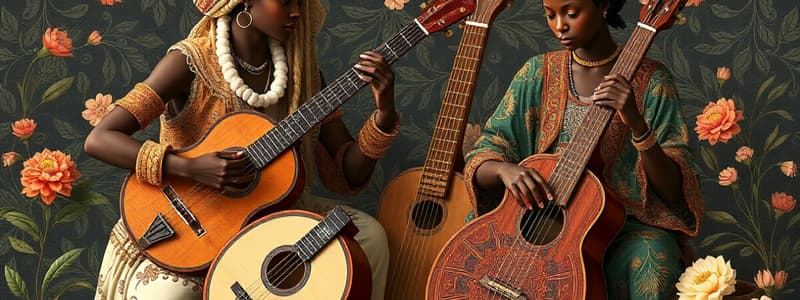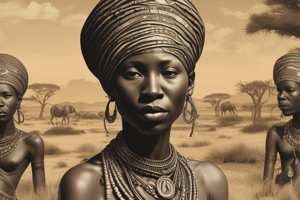Podcast
Questions and Answers
Which instrument is traditionally crafted by women?
Which instrument is traditionally crafted by women?
- Timbila
- Mbira
- Ngoma drum
- Udu drum (correct)
The Chopi tribe are known for their expertise with which instrument?
The Chopi tribe are known for their expertise with which instrument?
- Timbila (correct)
- Ngoma drum
- Mbira
- Bow harp
Which instrument serves a dual purpose as a storage vessel?
Which instrument serves a dual purpose as a storage vessel?
- Timbila
- Bow harp
- Mbira
- Udu drum (correct)
Which instrument is commonly used in religious ceremonies by the Shona tribe?
Which instrument is commonly used in religious ceremonies by the Shona tribe?
The ngoma drums hold particular significance for which group of people?
The ngoma drums hold particular significance for which group of people?
Which instrument's performance typically involves an improvisational melody followed by a syncopated rhythm?
Which instrument's performance typically involves an improvisational melody followed by a syncopated rhythm?
Which of these instruments originated outside of Africa?
Which of these instruments originated outside of Africa?
Which two countries still commonly make use of the bow harp?
Which two countries still commonly make use of the bow harp?
The yam harvest is a significant event celebrated with music and dance by which African group?
The yam harvest is a significant event celebrated with music and dance by which African group?
Which instrument is described as a 'thumb piano'?
Which instrument is described as a 'thumb piano'?
Flashcards
Udu Clay Drum
Udu Clay Drum
A percussion instrument from Nigeria, traditionally made by women, used in celebrations and can also function as a jug.
Yam Harvest Festival
Yam Harvest Festival
A celebration by the Igbo people marking the yam crop's significance, featuring music and dancing.
Timbila
Timbila
A xylophone-like instrument from the Chopi tribe of Mozambique, known for broad keys and improvised melodies.
Ngoma Drums
Ngoma Drums
Signup and view all the flashcards
Bow Harps
Bow Harps
Signup and view all the flashcards
Mbira
Mbira
Signup and view all the flashcards
Igbo farmers
Igbo farmers
Signup and view all the flashcards
Chopi tribe
Chopi tribe
Signup and view all the flashcards
Clan Drum Beats
Clan Drum Beats
Signup and view all the flashcards
Musical Function of Udu
Musical Function of Udu
Signup and view all the flashcards
Study Notes
Timbila of Southern Mozambique
- The Chopi tribe plays various instruments, most notably timbila xylophones.
- Timbila bands are led by a melody-improvising performer, followed by others playing a syncopated rhythm.
- This rhythmic style encourages energetic dancing movements.
Bow Harps of East Africa
- Bow harps are string instruments with a curved wooden bow extending from a hollow resonator.
- Players pluck strings and dampen unused ones with their other hand.
- Originated in ancient Egypt and Sumer, later spreading across Africa.
- Still used by many Ugandan and Sudanese tribal groups.
Ngoma Drums of Buganda
- Bantu peoples use various drums called ngoma.
- Different types found in different regions, especially in Buganda, Uganda.
- Drum beats are unique to each clan, with the king's drums holding special significance.
- Ngoma drums serve as a symbol of power and are essential in Bugandan culture.
Udu Clay Drums of Nigeria
- Igbo people in Nigeria primarily farm yams, making it their main staple food.
- The Igbo celebrate the yam harvest with festivals featuring parades, dances, and music.
- Percussion instruments are important, particularly the udu clay drum.
- Udu drums are typically made by women and played using hand slapping and finger tapping. They also serve as jugs or storage vessels.
Mbira of Zimbabwe
- Shona tribe music commonly includes the mbira, a small thumb piano.
- The mbira is played on a wooden board with staggered metal keys.
- Often accompanied by a musician using a rattle, particularly during religious ceremonies.
Studying That Suits You
Use AI to generate personalized quizzes and flashcards to suit your learning preferences.




